

Welcome to Pratham Books' StoryWeaver! The Ultimate Guide to Teaching Source Credibility. The Ultimate Guide to Teaching Source Credibility The Context: Why are we doing this?
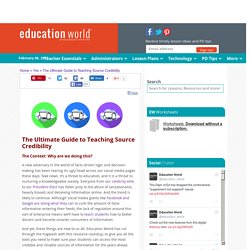
A new adversary in the world of facts-driven logic and decision-making has been rearing its ugly head across our social media pages these days: fake news. It’s a threat to education, and it is a threat to nurturing a knowledgeable society. Everyone from our celebrity elite to our President-Elect has fallen prey to the allure of sensationalist, heavily biased, and deceiving information online. And the trend is likely to continue. And yet, these things are new to us all. The Roots of “Fake News” The discussion of fake news often starts with addressing the role and function of satire. Next, students should understand that some “news” is created with the direct intention of tricking the reader.
That potential income associated with “clicks” online, too, seems to puzzle many. Public library - Carlaarena - Diigo. Nik Peachey. Learning Bytes from The Consultants-E. Technology for Business English Teaching. Social Bookmarking in Plain English, for the rest of us. What's the difference between social bookmarking and content curation? - Quora. Web Search Strategies in Plain English. What are the top 3-5 SEO areas where webmasters make the most mistakes? 50 Google Now Voice Commands. Tagxedo - Word Cloud with Styles. Tagul - Word Cloud Art. Meltwater IceRocket.
Numerical Data Search. FlickrStorm. Search on Flickr with some Magic. Tag Galaxy. Thinkmap Visual Thesaurus - An online thesaurus and dictionary of over 145,000 words that you explore using an interactive map. Visual Dictionary, Visual Thesaurus. Vionto. Alpha: Computational Knowledge Engine. Tips & Tricks – Google. ELTJ: Digital literacies. Digital literacies 5: Remix in the classroom. “Remix?
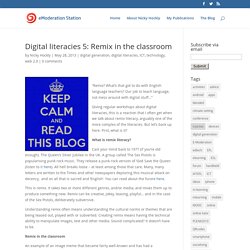
What’s that got to do with English language teachers? Our job to teach language, not mess around with digital stuff…” Giving regular workshops about digital literacies, this is a reaction that I often get when we talk about remix literacy, arguably one of the more complex of the literacies. But let’s back up here. First, what is it? What is remix literacy? Cast your mind back to 1977 (if you’re old enough).
This is remix. Understanding remix often means understanding the cultural norms or themes that are being teased out, played with or subverted. Remix in the classroom An example of an image meme that became fairly well-known and has had a considerable shelf life is ‘Keep calm and carry on’, usually accompanied by the image of the crown of the Queen of England (for the background to this meme see here). Keep calm and evade the policeKeep calm and call BatmanKeep calm and fake a British accentKeep calm and …arrghhhh. Digital literacies 4: Teens & social networks.
Photo by Nico Cavallotto A few years back my daughter (then aged 14) told me she was going out.
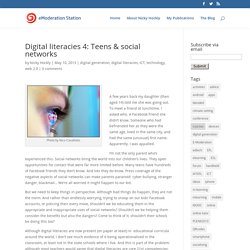
To meet a friend at lunchtime. I asked who. A Facebook friend she didn’t know. Someone who had befriended her as they were the same age, lived in the same city, and had the same (unusual) first name. I’m not the only parent who’s experienced this. But we need to keep things in perspective. Although digital literacies are now present (on paper at least) in educational curricula around the world, I don’t see much evidence of it being operationalised in the classroom, at least not in the state schools where I live. As English language teachers, we are very well placed to help develop our students’ (and our own) digital literacies through the medium of English. Nicky Hockly - Digital literacies part 1. ELTJ: The digital generation.
10 Great Google Search Tips for Teachers and Students. 1- Search for an exact word or phrase Use quotes to search for an exact word or set of words.
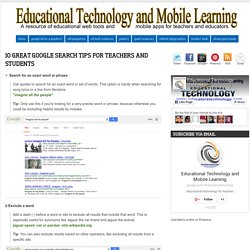
This option is handy when searching for song lyrics or a line from literature. "imagine all the people" Tip: Only use this if you're looking for a very precise word or phrase, because otherwise you could be excluding helpful results by mistake. Diigo - Better reading and research with annotation, highlighter, sticky notes, archiving, bookmarking & more.
Blogefl's podcasting_elt Bookmarks. Home - Evaluating resources - Library Guides at UC Berkeley. To find out more about an author: Google the author's name or dig deeper in the library's biographical source databases.
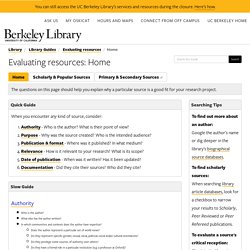
To find scholarly sources: When searching library article databases, look for a checkbox to narrow your results to Scholarly, Peer Reviewed or Peer Refereed publications. To evaluate a source's critical reception: Check in the library's book and film review databases to get a sense of how a source was received in the popular and scholarly press. Google Launches New Search Education Site with Lesson Plans. Google has launched a new site called Search Education aimed at educators who want to teach online search strategies.
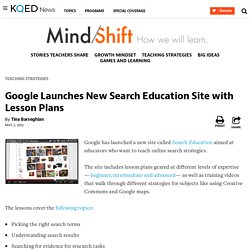
The site includes lesson plans geared at different levels of expertise — beginner, intermediate and advanced— as well as training videos that walk through different strategies for subjects like using Creative Commons and Google maps. The lessons cover the following topics: Picking the right search termsUnderstanding search resultsSearching for evidence for research tasksNarrowing a search to get the best resultsEvaluating the credibility of sources For each topic, lessons for every level of searcher goes into deep detail, offering background explanations of how search works the way it does, specific examples of search words and their results, and numerous tips. There’s also a short quiz at the end of each lesson. Lesson Plans and a Road Map for Teaching Search Strategies.